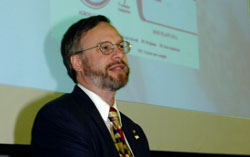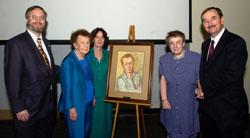Inaugural Seminar Honors Gift and Memory of Harry E. Wheeler
Inaugural Seminar Honors Gift and Memory of Harry E. Wheeler

When University of Kentucky plant pathology researcher Christopher Schardl stepped to the podium in late March to begin his seminar on tall fescue endophyte, it was a special moment.
Schardl’s presentation had the distinction of being the inaugural seminar of the Harry E. Wheeler Endowed Chair in Plant Mycology. The endowed chair was created by a $500,000 gift to the College of Agriculture by Wheeler, a distinguished scientist and retired UK faculty member who died in 1999.
“Dr. Wheeler’s generous gift was matched by the state and so funds actually total $1 million,” said David Smith, plant pathology department chair. “An endowed chair provides funding flexibility to an outstanding faculty member – in this instance Dr. Schardl who was appointed to the Wheeler chair in 2001 following an international search.”

(left to right) Christopher Schardl; Mary Wheeler, sister-in-law of Harry E. Wheeler; Mary Anne Smith, niece; Hattie Grace Wheeler, niece; Bill Wheeler, nephew. Harry Wheeler's portrait was painted by his wife, Naomi.
Under an endowment plan money is securely invested to provide a steady return. Research funds derive from the interest generated by the investment. The Wheeler endowment supports basic research and hiring, such as graduate students for plant mycology projects. An example is UK’s research on tall fescue endophyte, which can cause reproductive problems in cattle.
“We’ve been trying to modify tall fescue endophyte to remove the compounds it produces that can be toxic to animals,” said Schardl. “This modified endophyte might be useful to farmers in their forage production by improving the stand and longevity of the fescue while not harming the cattle.”
Professor Wheeler’s sister-in-law, nephew, and two nieces were present for Schardl’s inaugural seminar.
“Harry would be thrilled to see what the university has done to further what he devoted his life to,” said nephew Bill Wheeler of Clinton, Mississippi.
“The research he did was an important influence on the school, and we can now see that his influence still continues to benefit agriculture,” said niece Mary Anne Smith of Creedmoor, North Carolina.
Prior to Schardl’s seminar the memories of Wheeler and his wife Naomi, who preceded him in death, were honored.
“Naomi was an accomplished artist, and Harry was a world-class scientist, scrupulously honest and an individual who had the courage to stand up for his principles,” said Thomas Pirone, retired UK plant pathology faculty member and friend of Wheeler. “The graduate students and postdoctoral students who studied under him experienced tough and demanding appraisals from him, but those who heeded those appraisals became better scientists as a result.”
Wheeler was professor of plant pathology at UK from 1967 until his retirement in 1984. His many honors included being a Fellow of the American Association of the Advancement of Science, a Fellow of the American Phytopathological Society (APS), a delegate to the Tenth International Botanical Congress, and a John Guggenheim Fellow. His work was widely known, and was the subject of a 1956 Time magazine article. He was listed in the American Men of Science and World Who’s Who In Science.